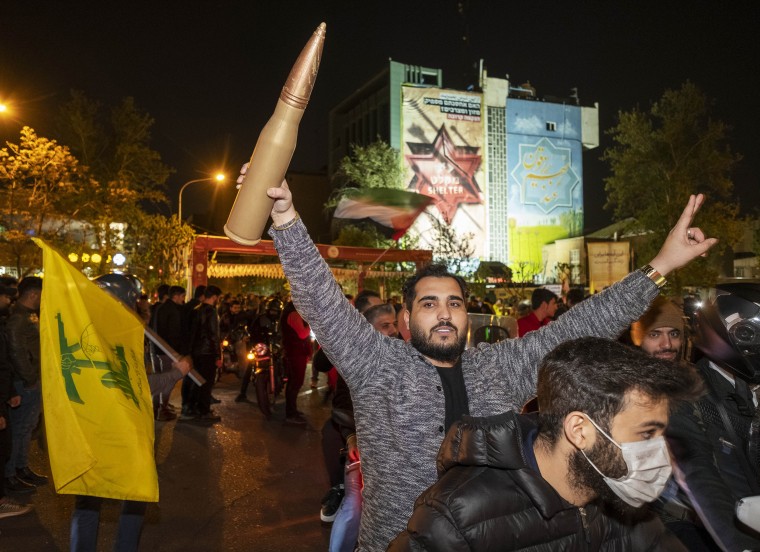Biden officials worry that Israeli response to Iran’s attack may trigger wider war
Iran’s retaliatory attack on Saturday — which swarmed Israeli airspace with hundreds of drones and missiles, while causing relatively limited damage — was unprecedented, but calibrated to show deterrence without provoking an all-out war, according to experts who spoke to NBC News.
Within hours of the strike, Maj. Gen. Mohammad Bagheri, the chief of staff of the Iranian armed forces, issued a statement saying the attack had “concluded and we are not willing to continue it.”
An Israeli official in the Prime Minister’s office told NBC News Sunday that “Israel is going to consult with all its partners but ultimately it’s Israel’s decision as to what the response will be.”
“Israel can’t allow such a large attack over Israel without some kind of response, be it small or large,” the official said. “It’s up to the war cabinet to decide now.”
U.S. officials had anticipated a response from Iran since Israel’s April 1 bombing of an Iranian diplomatic compound in Damascus. They raised questions not just about the severity of the threat, but how Israel would respond given an overall military strategy that a senior administration official and a senior defense official, referencing internal conversations, have characterized in interviews with NBC News as poorly considered, “frenetic” and with the potential to be “catastrophically escalatory.”

“I don’t think they had a strategy,” the senior administration official told NBC News about Israel’s bombing of Iran’s diplomatic compound in Damascus. “The Israelis don’t always make the best strategic decisions.”
Israel views Iran as an existential threat and has clashed with previous U.S. administrations on how to handle the regime, which doesn’t officially recognize the Jewish state. Most notably, Netanyahu openly lobbied against President Barack Obama’s landmark 2015 nuclear deal with Iran, which his successor Donald Trump pulled out of.
Iran, for its part, has been on the receiving end of a concerted U.S. and Israeli campaign to degrade its military capabilities, with attacks killing senior commanders who were working with proxy forces throughout the region and nuclear scientists at home.
‘Sleepwalking’ into war?
While the White House believes the Israelis are not looking for a wider conflict or a direct war with Iran, particularly given the resources they have fighting in Gaza, U.S. officials can’t be certain, the senior administration official said.
“There’s this urgency to act,” the official said, “and that’s what happened in Damascus,” referring to the April 1 strike on the consular building that killed two generals and five officers in the Iranian Revolutionary Guard Corps. The official said it’s the same frustration U.S. officials have with the way Israel is operating in Gaza.
Fawaz Gerges, a professor of international relations and Middle Eastern politics at the London School of Economics, criticized Biden’s ability to translate his concerns into influence over Israel’s military decision-making.
“The strategy of the Biden administration has failed miserably. Biden is sleepwalking the U.S. into another catastrophic war in the Middle East. His overarching goal of preventing the war in Gaza from escalating into neighboring countries has failed,” Gerges said. “Biden has failed to influence Netanyahu’s decisions either in Gaza or towards Iran.”

Benjamin Friedman, policy director of the think tank Defense Priorities, said in a statement that “the Israeli government has courted a fight with Iran, perhaps encouraged by the prospect of U.S. help in going after Iran.”
“Instead of talking about ‘ironclad’ support for Israel, the president should have made clear the U.S. support is limited and does not extend to all circumstances,” Friedman said. “War with Iran would imperil U.S. security for no obvious pay off.”
Washington-based Defense Priorities advocates restraint in U.S. foreign policy.
Regardless of the relative caution American officials were advocating, a U.S. military official told NBC News that U.S. forces in the region continue to shoot down Iranian-launched drones targeting Israel. “Our forces remain postured to provide additional defensive support and to protect U.S. forces operating in the region.”
In a statement released today, Israeli Defense Minister Yoav Gallant warned that the confrontation between Iran and Israel “is not over yet. … We must be prepared for every scenario,” and called Iran “a terrorist state.”
For Iran’s part, Amal Saad, a lecturer at Cardiff University’s School of Law and Politics who specializes in the study of the Iran-backed Lebanese political movement and militia Hezbollah, warned against interpreting the limited destruction caused by Iran’s strikes as reason to dismiss the country’s intentions or willingness to enter into a conflict with Israel if provoked.
The strikes, which closed down schools and sent thousands of Israelis into bunkers as sirens sounded, rockets streaked overhead and fighter jets roared, was deeply disruptive in Israel, and its scale showed that “Iran’s strategic patience was exhausted,” Saad said, referring to Iran’s tactic of military restraint and deterrence.

Iran, Saad said, was humiliated by Israel’s bombing of its diplomatic compound, and national dignity is “one of Iran’s foundational values.” It would have been impossible for Iran “to absorb that type of humiliation” she said. It “would mean Iran is no longer Iran.” Further strikes from Israel could inflame an Iran already at its limit.
That willingness was clearly underlined by Bagheri, Iran’s military chief of staff, whose statement said “if Israel attacks our interests we will respond with force and our next operation will be much bigger.”
“The bottom line is the Middle East appears to be descending into a wider regional war,” Gerges of the LSE said. “For now, the ball is in Israel’s court. Israel’s next move will determine if the region descends into further military escalation or de-escalation.”




